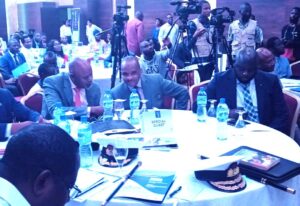Oluyinka Onigbinde
Indigenous ship owners operating in Nigeria have called for a forensic audit of the controversial Cabotage Vessel Financing Fund (CVFF) to determine how much has accrued since the inception of the funds before it was moved into Treasury Single Account (TSA) of the Federal Government.

The ship owners also alleged that proceeds from the CVFF have been tampered with and as a result there is need to have a forensic audit..
Recall that the CVFF was established under the Cabotage and Inland Shipping (Cabotage) Act of 2003, to provide finance to indigenous ship owners to maintain their vessels or purchase new ones.
The CVFF is an accumulated fund from a two per cent contribution by indigenous ship owners on every carried out in the Nigeria’s maritime sector.
Speaking during a 2022 stakeholders’ forum organised by Alumni of Maritime Academy of Nigeria Oron (AMANO) with the theme, “The State of the Nigerian Maritime Domain in 2022 and beyond in Lagos. Chairman, Starz Investments Company Limited, Engr. Greg Ogbeifun said since the establishment of Cabotage Act, nothing from the fund has been disbursed.
Apparently speaking the mind of ships owners; Ogbeifun who is also a ship owner, said that despite the non-disbursement, operators have continued to contribute two per cent of their contract values into the fund.
In his presentation titled, “How to be among the respected maritime nations,” Ogbeifun recommended forensic audit of the CVFF.
According to him, there is need for appropriate guidelines for the disbursement of the fund as demanded by the Act taking into cognizance of the Treasury Single Account (TSA).
He added that the Minister of Transportation; Mr Rotimi Amaechi has the responsibility to develop guidelines for the disbursement of CVFF, adding that nobody can touch the fund until new guidelines are out.
“Under the former guidelines, the contributions of the fund was going into the Nigerian Maritime Administration and Safety Agency (NIMASA) and NIMASA was warehousing the money into commercial banks, but when there is a change of government, the fund was transferred into TSA,” he said.
He said, existing guidelines can no longer be accessible and there is need to review the guidelines to take cognizance of the fact that the money is now in government’s coffers, adding that the law has to be changed before the money can be disbursed.
In his goodwill message, the Director General of the Nigerian Maritime Administration and Safety Agency (NIMASA), Dr. Bashir Jamoh said that CVFF is politicised, but assured that the fund would be disbursed.
He explained that the issue of audit is part of statutory requirement and that, the NIMASA account must be audited by Audited General of Federation.
Read Also: Clearing Agent Bags 2 Years Jail Over N115,000 Fraud
“Auditor General of Federation does audit the fund every year. Nobody can touch the money. It is in TSA account. Nine banks applied, we have shortlisted and sent to the appropriate quarters.
“If anybody tries to touch that money, the person is breaking the law. There are technical issues, but we will continue to push until it gets disbursed. Upon all these, we will not rule out the fact that the issue of the CVFF is politicised,” he added.
In his welcome address, the President of AMANO, Mr. Emmanuel Maiguwa said, with the advancement of ideas and technologies disrupting leading industries all over the world, it has become imperative that as leaders and players in the maritime industry of Nigeria, stakeholders must optimise all available resources and think outside the box to ensure that the Nigerian maritime industry is abreast and at par with standards and best practices all over the world
He noted that the stakeholder’s forum exists for this very reason; to drive important conversations amongst all relevant parties to tackle challenges in the industries that could impact the safety, security, and economy of the maritime industry and how it affects the country and beyond.
He added that the maritime domain in 2022 and beyond seeks to promote synergy between members, agencies, and stakeholders towards offering sustainable solutions to the challenges of the maritime domain as well as encourage intellectual and emotional ties between the academia and practitioners in the maritime industry.
Kindly like us on Facebook















